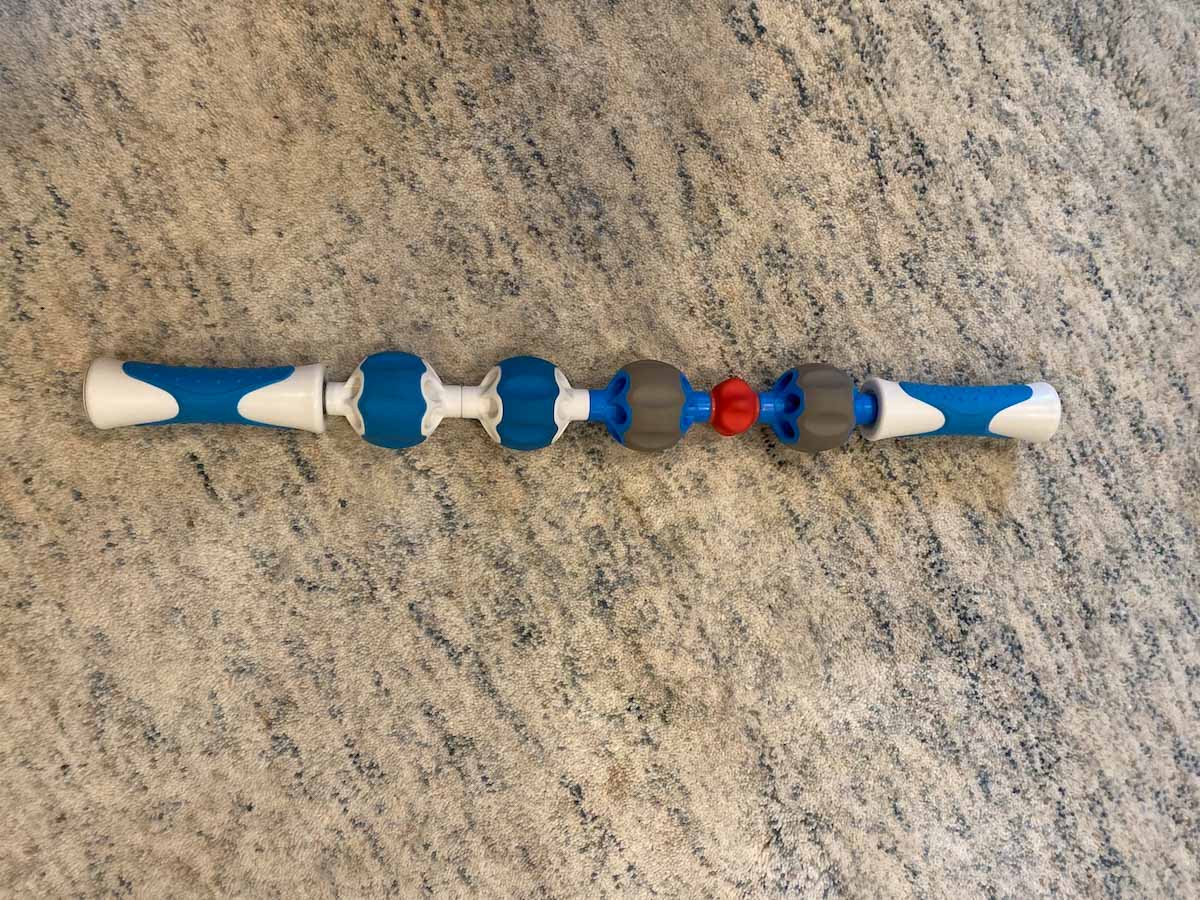It seems to me that massage sticks follow closely on the heels of foam rollers when it comes to being the most popular and useful recovery tools, and I’ve been impressed with the versatility and effectiveness of the Medi-Dyne Pro Stick Massage Roller ($48). I love keeping a massage stick in my recovery toolbox because they’re easy to deploy even when I’m not actively focusing on recovery, such as while watching a movie or lounging on the couch with my dog. In other words, even when I’m too lazy to foam roll, I still manage to reach for a massage stick and give my muscles a little love.
I spent several months during the peak of my ultrarunning season testing this massage roller, which is made up of a 21-inch steel bar holding five rings of three different sizes and densities and grippy handles on either end. It’s a well-designed, high-quality massage stick that’s helpful in targeting and rolling out muscles large and small. I have enjoyed using this so much that we’ve named it the best massage stick in our best recovery tools for athletes guide.
Shop the Medi-Dyne Pro Stick Massage RollerMedi-Dyne Pro Stick Massage Roller Features and Specifications
The standout feature of the Medi-Dyne Pro Stick Massage Roller is its series of rings, which the brand refers to as “gears.” Unlike standard massage sticks, which are frequently smooth or minimally textured, these varied rings add a lot of versatility. The blue-and-white ring is slightly softer than the gray-and-blue ring, and the smaller red ring is the most firm. The idea behind this design is that it will help users apply varied and targeted pressure to different areas, from the Achilles tendon or the shin to larger muscle groups like quadriceps, hamstrings, and shoulders.
The rings are held on an unbendable 21-inch steel bar, and on either end, 4.25-inch grips provide an ergonomic fit for most hand sizes. Medi-Dyne claims that the rings can be used in a circular or back-and-forth motion to massage muscles in addition to the more traditional rolling motion. However, I found this only to be effective if I was wearing fitted, close-to-skin clothing such as leggings or running tights. Otherwise, the rings would just get caught in the bunched fabric.
Medi-Dyne Pro Stick Massage Roller Performance
I can’t say that in a blind test, I’d be able to discern the differences between the blue-and-white and the blue-and-gray rings on the Medi-Dyne Pro Stick Massage Roller. The small red ring is obviously different, and I can feel its precision when applying pressure with the massage stick. Nonetheless, I found the positioning of the rings to effectively enhance the stick’s versatility — the two side-by-side blue-and-white rings feel great against larger muscles or when I want to be gentle on sore muscles, and the other rings combine to help me target smaller areas, such as the shin or iliotibial band.
I also love the handles. They’re just so comfortable and ergonomic, and grippy. Combined with the steel bar at the core, I can leverage this stick to dial in precisely the right amount of pressure at just the right spot.
Finally, this massage roller is light enough and small enough that it’s easily transportable, so there’s no question when it comes to tossing it into my gym bag or travel duffel.
Medi-Dyne Pro Stick Massage Roller Overall Impressions
Overall, the Medi-Dyne Pro Stick Massage Roller is a versatile recovery tool that offers a bit more than the standard massage stick. With its varied rings, it is effective in reaching small muscle groups or targeting tight spots.
But let’s be honest, it is a bit pricey for a massage stick. However, if you’re building out your toolbox, searching for a unique gift for a runner or athlete in your life, or if you are like me and get a little lazy with the foam rolling but have no problem reaching for a massage stick while idle, this could be a worthwhile investment.
To learn more, you can also read our best recovery tools for athletes guide, where we’ve named this the best massage stick.
Shop the Medi-Dyne Pro Stick Massage RollerCall for Comments
- What’s your favorite recovery tool?
- Do you have a go-to recovery routine?





